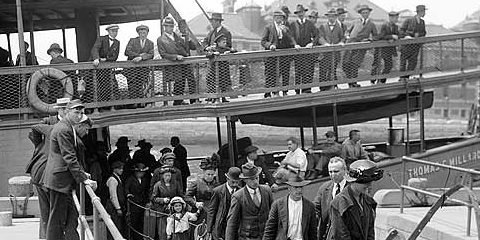
One hundred years ago, Congress passed and President Calvin Coolidge signed a new immigration bill that was relatively uncontroversial in the United States (it passed 69-9 in the Senate and 308-62 in the House of Representatives) but had global implications.
Its origins were in studies completed by the Dillingham Commission, which was established by President Theodore Roosevelt and tasked with studying and identifying which immigrants would contribute most to the American social fabric.
Unfortunately, the committee employed a variety of theories that combined Social Darwinian concepts of racial superiority with eugenics, and so, as one might expect, the profile of the ideal American immigrant was strikingly similar to that of the committee members.
The committee would consider and ultimately adopt criteria for suitability, ranging from physical details such as posture, head size and facial features to performance on literacy tests that focus on the ability to learn rather than the ability to read and write.
Scientists and scholars across the country welcomed these outward signs that distinguished “desirable” immigrants from those prone to crime, disease, and incompetence, and applauded the commission’s findings, which were incorporated into law to provide a basis for excluding certain immigrants.
Before federal law was passed, immigration issues were handled at ports of entry, as exemplified by the experience at Ellis Island, where hordes of people from far-flung countries were processed and usually only deported for obvious reasons, such as illness.
The new law required anyone wishing to enter the United States to first obtain a travel visa, which was allocated based on a quota system that severely restricted immigration from Eastern and Southern Europe. Because immigration from Asia was specifically banned, the law is commonly known as the “Japanese Exclusion Act.”
Labor unions especially supported the new law because it would keep out cheap immigrant labor and ensure that union workers maintained control over supplying labor to expanding American industry.
The act restricted immigration based on country of origin, but not from the Western Hemisphere, so immigrants from Canada and Mexico were welcomed without needing visas, literacy tests, or proper eugenic profiling, although Mexican workers were subject to a $10 tax on entry into the United States.
Sensing that the border with a neighboring country might be a source of trouble, the prohibitions of federal law were respected and the Border Patrol was established to ensure that immigrants from outside the Western Hemisphere could not clandestinely cross the border.
Thus, the 100th anniversary of the Immigration Act of 1924 is also the 100th anniversary of the U.S. Border Patrol. The creation of this federal agency later proved Congress correct in its assumption that immigrants from countries outside Latin America would try to use the southern border as a point of entry to circumvent immigration restrictions imposed at ports.
Perhaps the most significant impact of this act was its humiliating effect on Japan. While America had previously restricted immigration specifically from China, Japanese immigration had been restricted by an unspoken, secret “gentlemen's agreement.” The Immigration Act of 1924 removed all pretense that Japanese nationals were not welcome.
It is no exaggeration to say that this act contained some of the seeds of the anti-American sentiment that would eventually lead to open hostility between the two countries. Up until this time, Japan had looked up to the young United States and seen much to gain from being a trading partner and friend. The Japanese had adopted many aspects of American culture, from clothing to baseball.
Japan was a genuine world power and believed its interests were better aligned with those of the United States and Great Britain, so it entered World War I as an ally. There was strong sentiment in Japan to reform its government to bring it closer to the Western Allies, and delegates attended the Versailles Conference to express concern for the future of the world.
Specifically, Japan advocated relaxing immigration restrictions to prohibit discrimination on the basis of race and religion, a very progressive idea in 1919. Unfortunately, President Wilson worked hard to prevent these proposals from being included in the final agreement establishing the League of Nations.
However, Japan still bolstered its national morale with the pride of having been present at the conference and the honor that its diplomats had in being a member of the League of Nations. Following the example of its new allies, Japan established a constitutional monarchy with a democratically elected parliament. In other words, after World War I, Japan was globally recognized as a geopolitical leader and actor on the world stage.
After the immigration law went into effect, relations between the United States and Japan deteriorated. In the short time it took for news of the law's limitations to reach Japan, a young Japanese man set himself on fire in front of the U.S. Embassy in Tokyo, tariffs on U.S. companies and industries were doubled, Japanese embassies in the U.S. and other countries protested, and some ambassadors resigned.
No one in Japan could understand why they were being singled out for such a treatment. No sophisticated translator was needed to explain the act. No matter what pretexts or explanations there were, nothing could escape the simple fact that immigration law viewed Japan as a worthless, second-class country.
No matter how hard some Americans tried, they could not disguise in diplomatic terms that the law was degrading and fostering feelings of inferiority about Asian culture in general and Japan in particular. The former glory of equality and recognition as an ally faded, if not forgotten.
And for those in Japan who resisted constitutional reform and the adoption of American culture, the law called into question the transition to democracy. Rebellious Japanese aristocrats used the law to demonstrate American deception and provide a justification for rejecting American culture, economy, and institutions.
Far from incorporating Japan into the American sphere of influence, this act alienated Japan and the United States, and was one of many steps that led to conflict and ultimately World War II.
Will Sellers is a graduate of Hillsdale College and a justice on the Alabama Supreme Court. He can be reached at [email protected]
Do not miss it! Subscribe now Get the top Alabama news stories delivered to your inbox.







